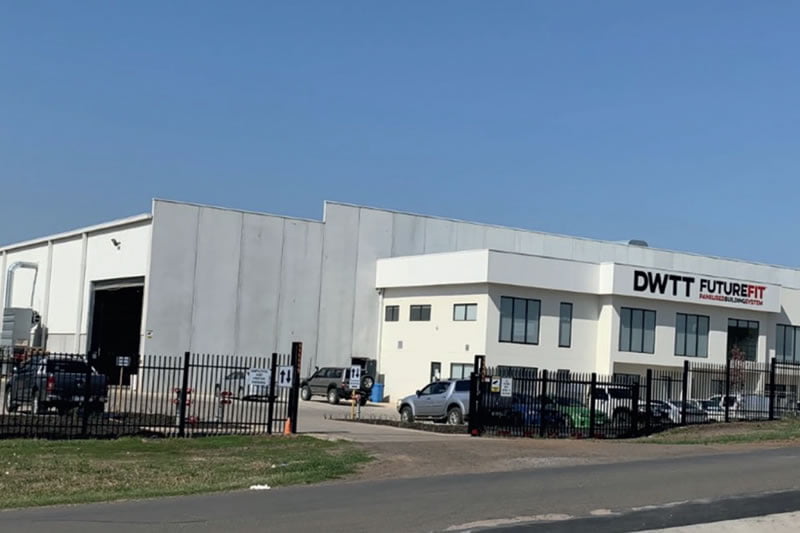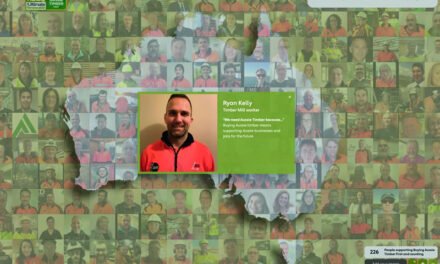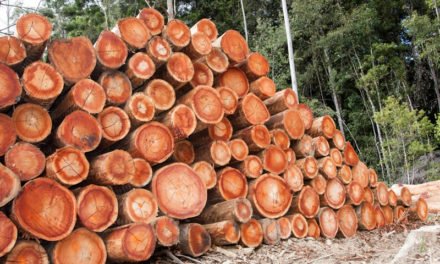Drouin West’s new manufacturing plant’s official opening.
After a long delay thanks to 2020, Drouin West Timber & Truss (DWTT) officially celebrated the opening of its new FutureFit offsite manufacturing facility on 23 April. Guests included Russell Broadbent MP and Gary Blackwood MP, as well as local government representatives, customers and the local business community who have helped in the building of the facility.
Sited on Weerong Road, Drouin, the ‘mega facility’ incorporates best-practice principles, including substantial investment in world-leading automated timber machinery from Germany and the US. After 60 years of first sawmilling and then fabricating in West Drouin, it’s another step forward for the innovative company, but not the easiest one they’ve taken.
“We opened the plant in January 2020,” says DWTT managing director Peter Ward, “but we’d just started to crank up when in March Covid hit. After a topsy turvy 2020, we’ve got a buoyant market flying along, now, and it’s only timber supply and ancillaries issues we need to sort.”
Ward jokes, but it has been one of the stranger years for a Victorian business investing strongly in growth. However, the move makes sense for both DWTT and the wider construction market.
“We’ve got strong orders in our panelised area, which was the main catalyst driving us to build the new factory and consolidate,” Ward says. “We needed increased capacity in that area, which has been our growth area of late and which is going really well.”
DWTT have been pioneers in panelised offsite manufacturing in Australia. Their first steps into the area came with the purchase of a plant for sale out of Queensland after that company’s demise. It was taken to West Drouin and run as a prototype for several years to develop the market and develop DWTT’s processes. Its success, however, was limited by space.
“We realised we needed to build a facility where we could consolidate and expand the capacity of both our conventional products – roof trusses, wall frames and floors – and even more the panelised area,” says Ward.
“We needed space to do more than one job at a time. It was having a sawtooth effect on our business – we’d do a project and when it finished the next one didn’t start perfectly on time, so we’d be up and down. We decided to expand to give us the ability to run multiple projects at the one time to take that sawtooth out of our business, and to capitalise on the increasing interest and demand in the area.”
A Regional Jobs and Investment Package grant helped, though, as Ward notes, “We’d made the decision to go down that path regardless – you don’t make big business decisions based on whether you get a grant or not – though you do appreciate them.”
The new plant produces both conventional and panelised FutureFit products. Ward says, “We’re prioritising the latter simply from a value-add point of view. Timber is less of a component of what we offer in the total offering. If you offer a wall frame, it’s 65% timber, if you offer a wall panel, that goes down to about 27%. Because you’re adding value to the offering, which is more efficient. That’s what’s behind our business decisions to increase what we can do here.”
In a year of difficult timber supply, this decision makes even more sense. “More and more people are realising the gains,” says Ward. “We don’t set out to be cheaper, we set out to be competitive, but the big saving is in the time and the efficient use of materials. Everything is precision cut and shorts are utilised in other areas within the build process, whereas on site there’s naturally more wastage. We’re having to use timber more efficiently now, because it’s becoming harder and harder to get.”
For more, visit www.dwtt.com.au












